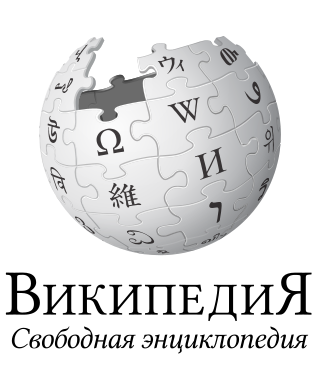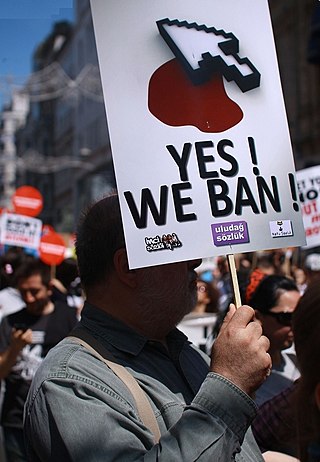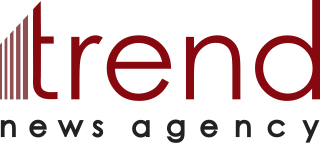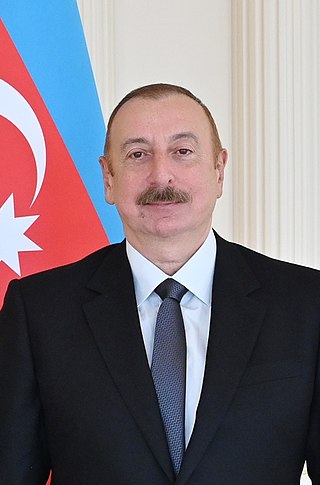Related Research Articles

Sumgait is a city in Azerbaijan, located near the Caspian Sea, on the Absheron Peninsula, about 31 kilometres away from the capital Baku. The city had a population of 422,600 at the 2019 Census, making it the second largest city in Azerbaijan after Baku.

The president of the Republic of Azerbaijan is the head of state of the Republic of Azerbaijan. The Constitution states that the president is the embodiment of executive power, commander-in-chief, "representative of Azerbaijan in home and foreign policies", and "shall have the right of immunity [from prosecution]." The president rules through his executive office, the Presidential Administration, consisting of a group of secretaries and departmental ministers. Additionally, there is a Cabinet of Ministers regarding economic and social policy and a Security Council regarding foreign, military, and judicial matters.

The Italian Wikipedia is the Italian-language edition of Wikipedia. This edition was created on 11 May 2001, and first edited on 11 June 2001. As of 1 June 2024, it has 1,866,304 articles and more than 2,519,961 registered accounts. It is the 9th-largest Wikipedia by the number of articles.

The Russian Wikipedia is the Russian-language edition of Wikipedia. As of May 2024, it has 1,981,757 articles. It was started on 11 May 2001. In October 2015, it became the sixth-largest Wikipedia by the number of articles. It has the sixth-largest number of edits (138 million). In June 2020, it was the world's sixth most visited language Wikipedia.

The Nagorno-Karabakh conflict was an ethnic and territorial conflict between Armenia and Azerbaijan over the region of Nagorno-Karabakh, inhabited mostly by ethnic Armenians until 2023, and seven surrounding districts, inhabited mostly by Azerbaijanis until their expulsion during the 1990s. The Nagorno-Karabakh region was entirely claimed by and partially controlled by the breakaway Republic of Artsakh, but was recognized internationally as part of Azerbaijan. Azerbaijan gradually re-established control over Nagorno-Karabakh region and the seven surrounding districts.

Mehriban Arif gizi Aliyeva is an Azerbaijani politician and physician who is the vice president and First Lady of Azerbaijan.

Lesbian, gay, bisexual, and transgender (LGBT) people in Azerbaijan face significant challenges not experienced by non-LGBT residents. Same-sex sexual activity has been legal in Azerbaijan since 1 September 2000. Nonetheless, discrimination on the basis of sexual orientation and gender identity are not banned in the country and same-sex marriage is not recognized.

Censorship in Turkey is regulated by domestic and international legislation, the latter taking precedence over domestic law, according to Article 90 of the Constitution of Turkey.

Odnoklassniki, abbreviated as OK or OK.ru, is a social network service used mainly in Russia and former Soviet Republics. The site was launched on March 4, 2006 by Albert Popkov and is currently owned by VK.
Internet in Azerbaijan is vulnerable to government monitoring and censorship. The ruling Aliyev family owns two of the three largest mobile operators in Azerbaijan. The ownership of the third large mobile operator is unknown, as it registered to an offshore company. The authoritarian regime in Azerbaijan has a history of blocking websites that criticize the government.

During the Russo-Georgian War, a series of cyberattacks swamped and disabled websites of numerous South Ossetian, Georgian, Russian and Azerbaijani organisations. The attacks were initiated three weeks before the shooting war began.

After the dissolution of the Soviet Union, Azerbaijan and Ukraine gained their independence from the Soviet Union and started a close friendship with establishing diplomatic relations in 1992. The relations of strategic cooperation, political, economical and cultural relations between two countries are at a very high level. Azerbaijan currently plays an important role in both organization and the foreign policy of Ukraine due to its strategic role in the region.

Trend News Agency is an Azerbaijani news agency which focuses on current affairs in the Caucasus region and Central Asia. The agency is pro-government.

Ilham Heydar oghlu Aliyev is an Azerbaijani politician who is the fourth and current president of Azerbaijan. The son and second child of former Azerbaijani president Heydar Aliyev, Aliyev became the country's president on 31 October 2003, after a two-month term as prime minister of Azerbaijan, through a presidential election defined by irregularities shortly before his father's death. He was reelected for a second term in 2008 and was allowed to run in elections indefinitely in 2013 and 2018 due to the 2009 constitutional referendum, which removed term limits for presidents. Throughout his electoral campaign, Aliyev was a member of the ruling New Azerbaijan Party, which he has headed since 2005.
Day.az is an Azerbaijani news portal established in 2003 by MP Anar Mammadkhanov, trading as the Day.Az Media Company. The content is published in Russian (day.az), English (today.az) and in Azerbaijani (milli.az) since February 1, 2010.
Censorship of Wikipedia by governments has occurred widely in countries including China, Iran, Myanmar, Pakistan, Russia, Saudi Arabia, Syria, Tunisia, Turkey, Uzbekistan, and Venezuela. Some instances are examples of widespread Internet censorship in general that includes Wikipedia content. Others are indicative of measures to prevent the viewing of specific content deemed offensive. The duration of different blocks has varied from hours to years.

Nawaat is an independent collective blog co-founded by Tunisians Sami Ben Gharbia, Sufian Guerfali and Riadh Guerfali in 2004, with Malek Khadraoui joining the organization in 2006. The goal of Nawaat's founders was to provide a public platform for Tunisian dissident voices and debates. Nawaat aggregates articles, visual media, and other data from a variety of sources to provide a forum for citizen journalists to express their opinions on current events. The site does not receive any donations from political parties. During the events leading to the Tunisian Revolution of 2011, Nawaat advised Internet users in Tunisia and other Arab nations about the dangers of being identified online and offered advice about circumventing censorship. Nawaat is an Arabic word meaning core. Nawaat has received numerous awards from international media organizations in the wake of the Arab Spring wave of revolutions throughout the Middle East and North Africa.

In Russia, internet censorship is enforced on the basis of several laws and through several mechanisms. Since 2012, Russia maintains a centralized internet blacklist maintained by the Federal Service for Supervision of Communications, Information Technology and Mass Media (Roskomnadzor).

The blockade of Nagorno-Karabakh was an event in the Nagorno-Karabakh conflict. The region was disputed between Azerbaijan and the breakaway Republic of Artsakh, internationally recognised as part of Azerbaijan, which had an ethnic Armenian population and was supported by neighbouring Armenia, until the dissolution of Republic of Artsakh on 28 September 2023.